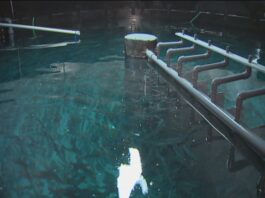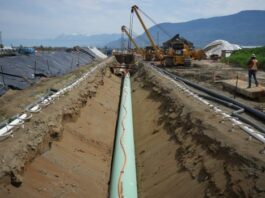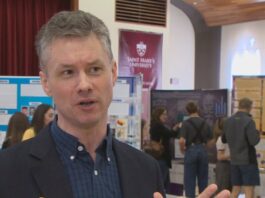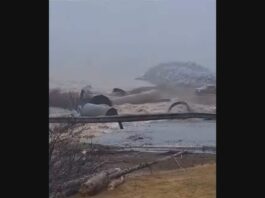
WARNING: This story contains distressing details.
The chief of a Manitoba First Nation says he’s open to the idea of police investigating the conduct of a former residential school priest now facing a criminal charge for abusing a child at a school in another Indigenous community in the province.
Minegoziibe Anishinabe (Pine Creek) First Nation Chief Derek Nepinak said Friday retired Father Arthur Masse also spent time at the Pine Creek Residential School northwest of Winnipeg and was “notorious” there.
Masse, 92, faces a charge in connection with the sexual assault of a 10-year-old female student at the Fort Alexander residential school, northeast of Winnipeg, sometime between 1968 and 1970.
Masse was the principal of what was called the Pine Creek residential school from July 1961 to July 1966, according to records from the National Centre for Truth and Reconciliation.
“I understand that there are people that may want to speak and … as a community now, we are opening up a dialogue to see if any of our community members want to speak about their run-ins and their encounters with this individual,” Nepinak said.
“I’ve heard stories about how he’s treated young people in the community,” he said.
Information compiled by the Societe historique de Saint-Boniface, an archive in Manitoba, said Masse was born in Ferland, Sask., in 1929. His first post was at the Fort Frances residential school in northern Ontario, where he stayed until 1957.
He later returned to that school in 1970 and oversaw the student residence until it closed four years later. Masse worked at a number of other schools during his time away from Fort Frances.
Nepinak said the Catholic Church retains a presence in his community and members will meet next week with Archbishop Albert LeGatt of the Archdiocese of St. Boniface to talk about the history of the church there.
“And we’ll ask some of these difficult questions that are being raised today, like why was [Masse] allowed to move from one community to the next for so many years when certainly there would have been cause for concern and incidents that would have been reported but yet unaddressed,” Nepinak said.
New potential unmarked graves
News of Masse’s arrest came on the same day the community learned ground penetrating radar searches of and around the grounds of the former residential school had turned up 27 new anomalies which could be unmarked graves.
Earlier in June, the community reported finding six such anomalies after a May search. The school, on the western shore of Lake Winnipegosis, was built in the 1890s and closed in 1969.

Another search is scheduled for Monday.
The discovery of additional anomalies isn’t a surprise, Nepinak said.
“I think that the community has been bracing for impact for the last number of months … There’s a heavy feeling, heavy hearts in our community, knowing that there’s oftentimes more questions than there are answers when these types of things are happening.
“But overall, I think the community’s doing the best we can with the information, and we’re taking it one day at a time.”
In a statement to the community on behalf of himself and council, Nepinak said they’d work with the Catholic church and the records they’ve been able to obtain so far to see if any of the anomalies correspond with designated gravesites.
They will also cross-reference the maps with known names of children who died while at the school. “But we have more work to do as these records are incomplete,” the statement said.
Nepinak said the community has yet to decide whether it will exhume any of the potential gravesites.
“That’s still a very difficult question to ask. Never mind find answers to what is the appropriate commemoration,” he said.
“We’re having those discussions and … we’re taking it one day at a time and we’re asking these difficult questions, but we’re not asking for immediate answers. We’re just hopefully going to arrive at a place that everyone can accept the things that we do and we documented properly so that our children’s children know what we did during these times,” said Nepinak.
Support is available for anyone affected by their experience at residential schools or by the latest reports.
A national Indian Residential School Crisis Line has been set up to provide support for former students and those affected. People can access emotional and crisis referral services by calling the 24-hour national crisis line: 1-866-925-4419.












